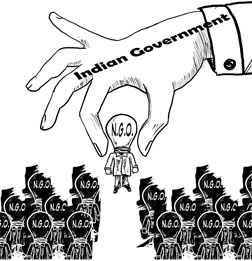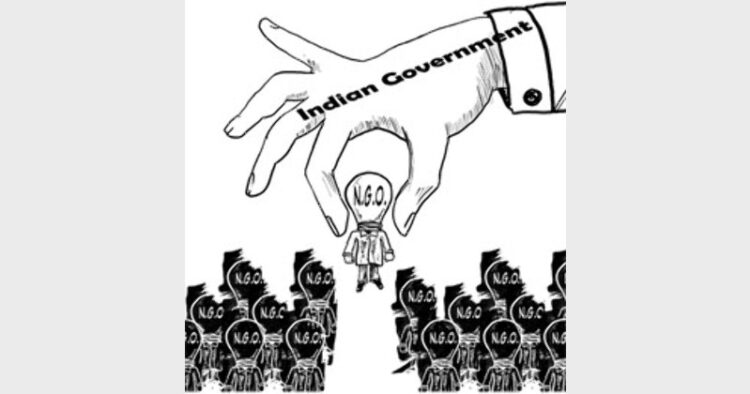Checks & Balances?
Intro: If we stand in favour of foreign funding then we may endanger democratic governments and, if we stand against foreign funding then we give a free hand to the tyrants.?
 The Government is poised to rein in foreign-funded NGOs and their immediate target is Greenpeace- An international Non Government Organsiation (NGO) that has been agitating against thermal and nuclear power projects in India and also in the rest of the world. Recently on the basis of a report, the Intelligence Bureau has singled out Greenpeace, saying the organisation”s campaign has anti-India agenda, is funded from abroad, and has been banned in the country.
The Government is poised to rein in foreign-funded NGOs and their immediate target is Greenpeace- An international Non Government Organsiation (NGO) that has been agitating against thermal and nuclear power projects in India and also in the rest of the world. Recently on the basis of a report, the Intelligence Bureau has singled out Greenpeace, saying the organisation”s campaign has anti-India agenda, is funded from abroad, and has been banned in the country.
| The solution may lie in the democratic governments setting up machinery to expose the machinations of the foreign-funded NGOs.? |
In response to the allegations, the NGO Greenpeace has accepted that they used funds from foreign donors, help organise protests, but denies that their motivation is anti-national.
All the NGOs cannot be painted with the same brush of having an anti-India agenda only. There are many philanthropy-oriented NGOs working in India and across the world. About 200 such NGOs have provided basic services during the genocide in Rwanda. Organisations such as Ekal are providing health and education in far-flung villages in India. And it is important that all such NGOs are not prohibited from receiving foreign funds.
| There is a huge danger in using legal instruments for preventing organisations from receiving foreign funds; for, in the same breath, we will stand against provision of foreign funds to fight tyrants.? |
There are organisations that are receiving funds for undertaking anti-national and criminal activities like for the 26/11 Mumbai terror attack or for spreading fake currency notes. Their activities should be prohibited under criminal law of the country and foreign funds for these should clearly not be allowed. But, in the middle of these two, there are large numbers of political and social organisations which defy a clear cut prescription.
In our history books, we had similar examples. Netaji Subhash Bose received funds from Japan for liberating the country from British yoke. In another instance, India provided support to Sheikh Mujib in his liberation war against the Pakistani regime.
A similar panorama of foreign funding for political activities exists at the global level too. Venezuela has formed a committee to examine receipt of funds by opposition parties from the United States. Russia has take action against an NGO which was active in monitoring the elections. Hungarian Government has taken action against NGOs that were receiving grants from Norway because allegedly the grants found their way to the small party named “Politics Can Be Different.” Myanmar Nobel Peace Prize recipient Aung San Suu Kyi is accused of receiving foreign funds. In all these cases foreign funds were received for political activities.
The legitimacy of such funding depends upon the nature of the government that they oppose. India’s support to Bangladesh in the 1971 War would be considered legitimate, if one thought, the Pakistani government is oppressive. The same would be illegitimate, if one thought, the Pakistani government is benign. The same holds for each of the cases narrated above.
The decision whether to allow foreign-funds to NGOs have to be undertaken under a situation where the character of the government of the host country is uncertain. This decision cannot be left to the host governments because than the funds would fall directly into the hands of the tyrants.
Would we have allowed the British Government of India to decide whether Subhash Chandra Bose be allowed to receive foreign money or not? The difficulty is profound. If we stand in favour of foreign funding then we may endanger democratic governments as is alleged to be happening in Venezuela. On the other hand,and if we stand against foreign funding then we give a free hand to the tyrants as is the case in British India.
There is no alternative to providing support to people oppressed by tyrants. Could we possibly leave the Bangladeshi’s to be massacred by the Pakistani forces? Because while doing so we also open the gates for foreign funds that are sent to destabilise democratic governments. Once we support the provision of foreign funds to oppose tyrants, then we cannot oppose the provision of foreign funds against benign governments. The big question is who will decide whether a government is tyrannous or benign? For a tyrant will doubly claim that he is benign.
Yet we need to find a way to prevent foreign funds from destabilizing democratic governments. The solution may lie in the democratic governments setting up machinery to expose the machinations of the foreign-funded NGOs. For example, the Government of India could publish a white paper on the activities of Greenpeace. As per my knowledge Greenpeace is opposing thermal power plants on grounds of global warming, loss of biodiversity and negative impact on livelihoods of the tribal people. The government should come out with its position on these issues and convince the people that Greenpeace is not working in their interests.
I have been a consultant to foreign donors like Swiss Development Cooperation, Care and Oxfam. I can say with confidence that many NGOs supported by foreign money have no presence whatsoever on the ground at all. They exist like oil on water. The people perceive them as baking their own cake. So instead of attacking Greenpeace legally; it is better to expose its people and render it ineffective.
There is a huge danger in using legal instruments for preventing organisations like Greenpeace from receiving foreign funds; for, in the same breath, we will stand against provision of foreign funds to fight tyrants. Bigger danger is that the good work possibly being done by other organisations will become subject to the predilections of some government officials. Therefore, this decision should be left to the people. Let me clarify that I do not agree with their anti-thermal and anti-nuclear power stance. But here the issue is different: Important to understand is that should we use legal provisions to smother an opposing view on the ground that it is foreign-funded?
We should realize that capital has become denationalized. Foreign Direct Investment has free entry into the country. Then why not provide free entry to those opposing FDI too? There is no consensus yet on the
beneficial impacts of FDI. So both sides should be heard. The
proceedings in a court are a sham if only one party is allowed into the courtroom and other is denied entry. Similar is the case with supporters and opposers of global capital.
It is well known that global capital has made global alliances in the International Monetary Fund (IMF), World Bank, World Trade Organisation (WTO) and World Economic Forum. It is only legitimate that the opposition to these organizations is also allowed to make global alliance so that people can decide. The WTO meeting at Seattle was stymied by international NGOs coming together. The World Economic Forum meeting at Melbourne was similarly attacked. Foreign funding for these resistances should be encouraged not because they are right but because that is how the debate proceeds and people get a chance to decide.
-Dr Bharat Jhunjhunwala? (The writer is former Professor of Economics at IIM Bengaluru)














Comments